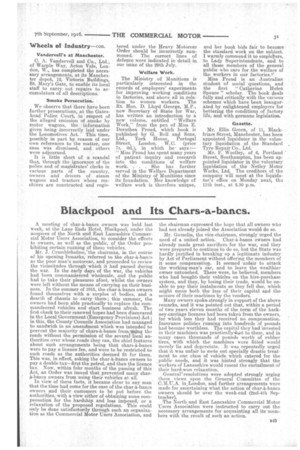Blackpool and Its Chars-a-bancs.
Page 11

If you've noticed an error in this article please click here to report it so we can fix it.
A meeting of char-i-bancs owners was held last week, at the Lane Ends Hotel, Blackpool, under the auspices of the North and East Lancashire Commercial Motor Users Association, to consider the effects to owners, as well as the public, of the Order prohibiting certain running of these vehicles_ Mr. J. Crumbleholme;the chairman, in the course of his opening lei:narks, referred to the char-a-banes as the poor man's motorcar, and proceeded to review the vicissitudes through which it had passed during the war. In the early days of the war, the vehicles had been commandeered wholesale, and the public had to take their pleasures afoot, whilst the owners were left without the means of carrying on their business. In the summer of 1915, the char-h-bancs owners found themselves with a surplus of bodies, and a dearth of chassis to carry them; this summer, the owners had been able practically to replace the commandeered vehicles and start business afresh. The first check to their renewed hopes had been discovered in the Local Government (Emergency Provisions) Act ; in this, the County Councils Association had managed to sandwich in an amendment which was intended to prevent the majority of chars-k-banes from using the roads without the permission of the several local authorities over whose roads they ran, the chief features about stich arrangements being that chars-à-banes were to pay a licence fee, and were to be restricted to such roads as the authorities deemed fit for them. This was, in effect, asking the char-I-banes owners to pay a double tax—first the petrol, and then the licence tax. Now, within foiir months of the passing of this Act, an Order was issued that prevented many chara-bancs owners from using their vehicles at all. In view of these facts, it became -clear to any man that the time had come for the case of the char-a-banes owners and their customers to be put before the authorities, with a view either of obtaining some compensation for the hardship and loss imposed, or a relaxation of the proposed regulations. This could only be done satisfactorily through such an organization as the Commercial Motor Users Association, and
the chairman expressed the hope that all owners who had not already joined the Association would do so.
Mr_ Gosselin, the vice-chairman, strongly urged the need of a united action. Char-a-bancs owners had already made great sacrifices for the war, and they were prepared to continue to do so, but the State was hardly justified in breaking up a legitimate industry by Act of Parliament without offering the members of it some compensation. It seemed unfair to attack the working-man's car, and to leave the wealthier owner untouched. There were, he believed, members who had bought, their vehicles on the hire-purchase system and they, by losing their trade, would be unable a pay their instalments as they fell due, which might mean both the loss of their capital and the seizure of their machines by the vendors. Many owners spoke. strongly in support of the above remarks, and it was pointed out that, within a period of two years eleven months of the term of the hackney-carriage licences had been taken from the owners, for which loss they had received no compensation. Insurance policies running into hundreds of pounds had become worthless. The capital they had invested in their Machines was practieallyslast to them, and in many cases thousands of pounds worth a rubber tires, with which the machines were fitted would merely lie and depreciate. It was repeatedly urged that it was unfair to mete out specially drastic treatment to one class of vehicle which catered for the public needs, and it was hinted strongly that the workers of Lancashire would resent the curtailment of their hard-won relasration.
General1 resolutions were adopted strongly urging these views upon the General Committee of the 0.M.U.A. in.London, and further arrangements were made for ascertaining what the action of char-h-bancs owners should be over the week-end (2nd4th September).
The North and East Lancashire Commercial Motor Users Association were instructed to carry out the necessary arrangements for acquainting all its mem bers with result of such an action.




















